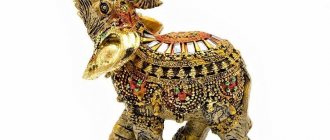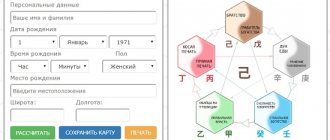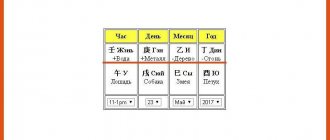Ancient Chinese art
Feng Shui is a very old art, which was banned for a long time, but was discovered relatively recently by Europeans. If we literally translate the name, which consists of two hieroglyphs, we also get two words: fen - wind, shui - water. This combination is first found in the Treatise on Burials, dated 5 millennium BC, but the history of Feng Shui is much older.
Chinese science is the result of the empirically accumulated experience of many generations, which was documented approximately seven thousand years ago.
For those living at that time, water and wind were the most powerful natural forces. The harvest, prosperity, and human life itself depended on their favor. Therefore, the elements had to be favored so that they would not punish the village with drought or mudflow. However, if in Europe paganism meant worshiping the forces of nature, bringing gifts and sacrifices, then in China a different approach prevailed. The sages observed the elements, reflected on their essence and dual nature. After all, the wind could either bring a bountiful harvest or destroy the crops with a hurricane. Water, on the one hand, could provide abundant food for livestock, and on the other, devastate entire provinces with floods. This knowledge became the basis for the emergence of Feng Shui - the doctrine of the optimal arrangement of objects in space to ensure the beneficial movement of energy.
The Chinese believe that everything on Earth is permeated with invisible, life-giving energy. They call it “qi” or “ki”, in India another word became widespread - “prana”, the American Indians knew it as “orenda”, the Polynesians used the name “mana”, and the ancient Germans - “od”. It is an all-pervading, sacred, primordial, cosmic energy of divine origin. Thanks to her, all life on earth exists. It unites humans and plants, animals and stones, the dead and the living. The well-being of the surrounding world and its inhabitants directly depends on how freely and unhindered energy can flow in space. Therefore, to acquire health, luck, love, respect or wealth, you only need to correct the flow of Qi. Feng Shui, acupuncture, Chinese numerology and astrology, and many martial arts are based on this main postulate.
Origins and origins of Feng Shui
Feng Shui is Chinese geomancy, science and art, the origins of which go back centuries.
The teaching of Feng Shui originated in Ancient China more than three thousand years ago and, passing from generation to generation, continued to develop and improve until the present day. The task of feng shui is the correct placement of objects in a person’s living space, which allows one to control the life force (qi) for the benefit of people.
The scope of feng shui extends to household items, furniture, rooms, residential buildings, workplaces, land, cemeteries, etc.
Feng Shui is in no way a collection of prejudices and superstitions, and also does not contradict the dogmas of any known religions, traditions and customs. This teaching borders on such areas of human activity and knowledge as diplomacy, ecology, politics, geography, astronomy and design. Feng Shui data is consistent with the conclusions of scientists working on the problems of terrestrial magnetism, astrophysics and psychology.
The only difference is that the principles of Feng Shui sometimes prove to be beyond logical explanation and remain a mystery to the uninitiated.
Feng Shui techniques are applicable on a variety of levels. They cover a wide range of areas of human life and are capable of adjusting the development of states, cities, communities, families and individuals.
As for individuals, Feng Shui can reach the highest degree of individualization, depending on the individual's personal requirements, wishes and criteria.
The philosophical basis of Feng Shui is also extremely extensive: it includes all the canonical Chinese ideas about the energy of qi, based on the concepts of the I Ching (the creation of which in 3322 BC is attributed to the legendary Chinese sage Fu Xi), and on the principle of Tao described in Lao Tzu's treatise Tao Te Ching (1122 BC).
These two books are the key to understanding the silent dialogue between Man and Nature, carried out through the invisible forces that govern the Universe and have a decisive influence on our destinies, bodies and minds. These two forces are Tao (the fundamental substance of the Universe) and Qi (the cosmic breath of life).
Divine Harmony
The history of Feng Shui is closely connected with one of the mythical emperors of China - Wu of the Xia clan. According to legend, he was working on the banks of the Yellow River when a huge turtle crawled ashore. According to old beliefs, this was a favorable sign, since in Ancient China they believed that gods lived under the shell of turtles. However, as soon as Emperor Wu took a closer look at the guest, he saw an amazing pattern (Lo Shu) on her back. In the strange 3x3 square, later called magic, there were numbers from 1 to 9. The sum of all diagonals, rows and columns was 15. This fact delighted and surprised the emperor, so he ordered the court sages to study the turtle shell. It was from the magic square that Feng Shui, the classical I-Ching - Book of Changes, Chinese astrology and numerology began their history.
For a long time, Feng Shui was considered a divine gift, so only members of the imperial family - divine descendants - could use it. Feng Shui masters worked for the emperor, erecting tombs and tombs, palaces and temples. To prevent the spread of divine science among his enemies, the emperor strictly controlled the masters. They were often not allowed to leave the palace; the transfer of knowledge took place within the same family.
Belief in the power of Feng Shui was so unshakable that the secrets of the teaching were considered information of national importance. According to legend, the chief adviser to the Imperial House of Hi Tsang, named Yang Yun Sang, was able to systematize and streamline the teaching. According to his books, the first ruler of the Min dynasty, Zhou Yuanzhang, built his own palace, but then ordered the execution of all Feng Shui masters, replacing the books with fake ones, so that no one else could take advantage of the benefits granted by divine science. The third emperor of the Ming Dynasty used forged sources when he built the Forbidden City. The latter, as is known, soon burned to the ground. Lost knowledge was rediscovered only during the Qin Dynasty.
About yin and yang
The natural interaction of the forces of yin and yang must be maintained at all levels, starting with the individual. A person's character and health reflect the movement of yin and yang in his body, which in turn is influenced by the objects around him, the area in which he lives, and the degree to which he has subjected his natural environment to changes.
In this regard, a whole range of problems arises. At an ecological level, large-scale cutting down of trees or diversion of river channels can lead to floods or droughts. On a personal level, problems range from increased dampness in the home to bouts of insomnia, from career setbacks to deteriorating health.
A feng shui specialist working on an individual level can suggest various ways to correct these problems. In the worst case scenario, he may suggest moving the house to another location altogether, but such situations are extremely rare. As a rule, the necessary changes do not require large financial investments and do not take much time.
The art of Feng Shui is highly respected in many areas of the Far East, especially Hong Kong. A Feng Shui master usually takes as much part in the planning of a building as an architect.
Sometimes during construction work, consultations with a geomancer are constantly used. If the business of a company is in decline, the owners of the company often turn to a Feng Shui master for advice in order to improve the situation; sometimes it is enough to move the catalog boxes or move the doorway to another part of the wall.
In the case of a child suffering from chronic illness or doing poorly at school, the solution to the problem may simply be related to the size of the study table or the position of the bed in relation to the window. Even in situations where there is no room to rearrange the furniture and changes in the building structure are impossible, it is almost always possible to find a partial solution to the problem.
A properly placed mirror or a living green plant can restore harmony to your home.
Mass distribution of art
Chinese ruling class philosophy encouraged a very limited process of transmission of secret knowledge. Most often, information was passed on from the father to the eldest son. The process of learning the secrets of Feng Shui lasted for many years, even decades. But, despite this, history wanted Feng Shui to go beyond the imperial palace, and in the 19th century, beyond China. In 1868, Reverend Yates, who came to the country as a missionary, published the first English-language article on ancient art. In 1873, Ernest J. Eitel continued the topic with a whole book.
The popularity of the destination, however, has encountered certain difficulties. After the overthrow of the imperial power and the emergence of the communist government, the use of Feng Shui became officially prohibited. Therefore, science went underground again. Dramatic events in the country caused massive flows of refugees, who brought to the new land the familiar teaching about the harmonious flow of divine energy. This is how Feng Shui appeared in Taiwan, Hong Kong, the USA, and Europe. Carefully transferred by Chinese emigrants to a foreign land, it flourished magnificently in the twentieth century.
Feng Shui teaches harmonious existence, being in balance with nature and the surrounding space, joy and harmony. This is a way to arrange your life in such a way as to receive maximum benefits and benefits. Our apartment, house, workplace, bedroom, according to the Feng Shui tradition, are a kind of tuning fork for the harmonious sound of a cosmic melody. If we tune the space in the right way, we will get a wonderful melody, which in practice will affect the health, luck, and well-being of the residents.
Feng Shui in modern times
Today everyone can join the art of Feng Shui. You don't have to be a master to understand the basic practical techniques of Feng Shui, but you will have to learn some of the principles and laws of this ancient art.
Nowadays, Feng Shui is becoming increasingly popular. Some consider it their hobby and, having a creative approach to the issue, begin to practice it in their home, with relatives or friends, trying to bring the decor of the rooms to absolute harmony, while many have chosen the profession of Feng Shui consultant and practice Feng Shui professionally.
Every day this profession is becoming more and more in demand. A Feng Shui specialist, having knowledge about the balance of forces such as Yin and Yang, about the flow of energy “Qi” that runs along the landscape and penetrates into all structures, can give recommendations in the construction of buildings and structures, as well as help equip existing ones houses, apartments and offices according to all the rules of Feng Shui.
The popularity of the ancient Chinese art of Feng Shui in the West is rapidly growing, because it helps develop the practice of traditional geomancy, which does not provide such a deep understanding of the relationships between people, their environment and various structures.
Today, the Feng Shui knowledge system is used both on a city scale and on the scale of an individual house or apartment, room or piece of furniture.
The art of Feng Shui combines the ideas of Taoism, Buddhism, as well as Chinese folk magic. Its effect extends to the superstitious, pragmatic, sacred, profane, emotional and even physical levels.
Source: fanshui.web-3.ru
Philosophy of teaching
Let's return to the translation of Feng Shui symbols again. Water is necessary for all forms of life on our planet (plants, animals, people). The wind carries water: it raises evaporation, collects moisture in rain clouds and spills it on the ground. Wind and water are key factors for life. From a Feng Shui point of view, they also carry Qi energy. Therefore, the optimal conditions for a favorable, harmonious space are the presence of water and wind. However, one should not belittle the need for other elements: metal, earth, wood. The art of Feng Shui teaches how to harmoniously combine all the elements in one space to ensure the unhindered flow of Qi energy. Feng Shui is based on three basic principles:
- all-pervading, all-encompassing energy Qi;
- stable balance of complementary Yin and Yang;
- active interaction of the five primary elements.
By allocating a suitable place for each item from the point of view of Feng Shui, you can improve your health, financial situation, relationships with relatives, career advancement, etc. It is noteworthy that you can use individual symbols of primary elements, associations, color schemes, suitable shapes and quantities. Try it, maybe the ancient Chinese art will be useful to you too.
The system of five elements is an important component of Feng Shui
More than three thousand years ago, the Chinese had already established the order of the Five Elements (Wood, Soil, Fire, Water and Metal) - forces or substances that describe all phenomena and properties in the Universe. These five elements are a manifestation of the constant interaction of the forces of yin and yang.
The five elements influence each other, generating and destroying each other in a fixed sequence.
The cycle of generation is as follows: fire creates soil (ash), soil creates metal, metal produces water (smelting, liquefaction, and evaporation), water nourishes wood (plants need water), and wood allows fire to live (combustion).
Fire – Soil – Metal – Water – Wood – Fire.
The cycle of destruction of elements occurs in a different order: the tree damages the soil (roots destroy the soil), the soil prevents water (by absorbing it), water extinguishes fire, fire destroys metal, and metal cuts down wood.
Wood – Soil – Water – Fire – Metal – Wood.
The Chinese correlate these five elements with periods of time, cardinal directions, substances, human sense organs, colors (paints), psychological states, etc.
Source: gorodnaneve.com
Tips for arranging an apartment
Even seemingly insignificant details when decorating a home play a big role in harmonizing energy flows. A few tips will help you place furniture correctly and get rid of objects that attract Sha. A clear proof that the right effect has been achieved will be the desire of the apartment owners to return to it.
- In no case should you install bulky cabinets or create mezzanines near the front door and passages to rooms. Qi should flow freely throughout the space. It is difficult for it to fill sharp corners, so you should not get carried away with them in the interior.
- Repairs need to be carried out more often, as dust and cracks cause stagnation of energy and have a bad effect on the atmosphere of the apartment.
- Broken dishes are a bad omen among many nations. In the teachings of Feng Shui, it is absolutely prohibited. The sooner you can get rid of it, the sooner joy and abundance will come to your home.
- Getting rid of unnecessary trash, old clothes and broken objects is also necessary to establish harmony. If something is expensive and it would be a shame to throw it away, it should be cleaned and repaired.
- Doors to rooms should open inward, and only the door to the bathroom should open outward.
- Flowers and animals attract Qi. If the plants take root well and bloom, the energy resource of the home is high.










